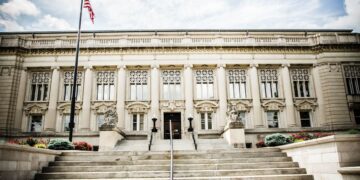By Frank J Biga III –
There is much speculation lately of a possible brokered GOP convention in Cleveland. Donald Trump only has around 739 delegates lined up and may not be able to reach the 1237 necessary for victory on the first ballot. There is even the most heinous of rumors of a plot that insider establishment types are stacking the decks of the convention Rules Committee which could change the rules on delegates being bound to their candidate on the first ballot if Trump does reach the 1237 delegate threshold.
Since some of Trump’s delegates will in fact be party insiders chosen at state conventions, if this happens Trump could lose the nomination before the convention starts. Like nuclear weapons though, the consequences of this tactic are so disastrous that they are unlikely to be used.
So, let’s assume Donald Trump wins the nomination and then reshapes the electoral map and wins enough Rust Belt states to win the Presidency. Now what? He would certainly use executive orders where legally applicable to reverse much of the damage done by President Obama through his use of executive orders.
He could change some of our diplomatic stances towards other countries and perhaps usher in a new paradigm in foreign affairs that might actually give peace a chance in the Middle East and elsewhere. He certainly would negotiate better trade deals with Mexico and other East Asian states. Trump would need the Congress though to fundamentally change the trajectory this country is on. But even passing laws with an agreeable Congress would not make the changes permanent.
So, a President Trump should look to reinvigorate something akin to the Bricker Amendment of the early 1950s. It would be very difficult to do and would require Presidential leadership even though the President is not involved in the Amendment process. This would be a permanent change and would give more power to Congress and tilt the balance away from the executive in the long run. It certainly would be a change from the recent giveaways by Congress on fast-track trade promotion authority. The American people could be first again.
For those of you unfamiliar, John Bricker was a three term Governor of the state of Ohio and also served as its junior Senator in the late 40s and early 50s along with Robert Taft. Bricker also ran as the Vice-Presidential candidate with Thomas Dewey in the 1944 Presidential race. His views were pretty conservative and today he would be most likely labeled a reactionary in the GOP. Bricker was an outspoken opponent of the New Deal and its effects on individual freedom.
But Bricker, like many other Senators of the time, was also against the internationalism that had infiltrated our foreign policy establishment since the Spanish-American War. This interventionist strain was even more rampant after World War II. The United States was now embroiled in nation-building overseas and had signed treaties ranging from membership in the United Nations to NATO and had given economic assistance to rebuilding countries with the Marshall Plan. And by this time it had also lost over 50,000 men in the disastrous Korean War.
Some of this interventionism may have been necessary to counter the Communist threat. But it was feared by some that Article VI or the Supremacy clause of the Constitution which made any treaties that were signed superior to the laws of the federal government and the states would undermine and sacrifice the rights and liberties of individual Americans. In other words, many Americans feared what we now know as globalism.
In 1952 and then again in 1953, a motley coalition of Senators came together under Bricker’s leadership to offer a Constitutional Amendment which would have effectively ended that aprt of the Supremacy Clause guaranteeing our individual and state rights and federal laws would not be negated by new trade agreements, treaties or executive agreements with foreign powers. There were several versions of this Amendment over the course of two years. Some Senators from the South like Harry Byrd of Virginia and Allen Ellender of Louisiana assisted Bricker largely out of concerns that UN charters would undermine the segregationist policies of the South. Midwestern Senators like William Jenner and Joe McCarthy feared Gramscian designs to undermine the United States from within. Everett Dirksen of Illinois, a moderate, also supported the Amendment.
Ultimately the Amendment failed twice in the Senate, once by only one vote (60-31). President Eisenhower and Majority Leader Lyndon Johnson had to pull out all the stops. Johnson, who actually voted for the Amendment himself, had the ill Senator Kilgore of West Virginia found and brought to the floor for Vote 31 against it killing it. How cynical!
Bricker’s attempts here are indicative of the more nationalist America-First strain of conservatism that had begun with Charles Lindbergh in the 1930s. It was and still is not so much a reaction to American decline but rather a reaction to the something that is so hideous and unwelcome by a majority of Americans – the erasure of national boundaries and the loss of American sovereignty.
Donald Trump has once again tapped in to this vein that has never really left our country. It may have expressed itself in different ways and through both parties at times, but it is still there. The country wants trade, but it wants fair trade. The country does not want to return to isolationism, but it wants a less aggressive foreign policy. It does not want to bear the burden of policing the world. It wants a government and a President that looks out for the people first.
The period of the American Caesar must end. The quest to conquer the world must end. It’s time to bring back the Bricker Amendment and return the government to the people.







